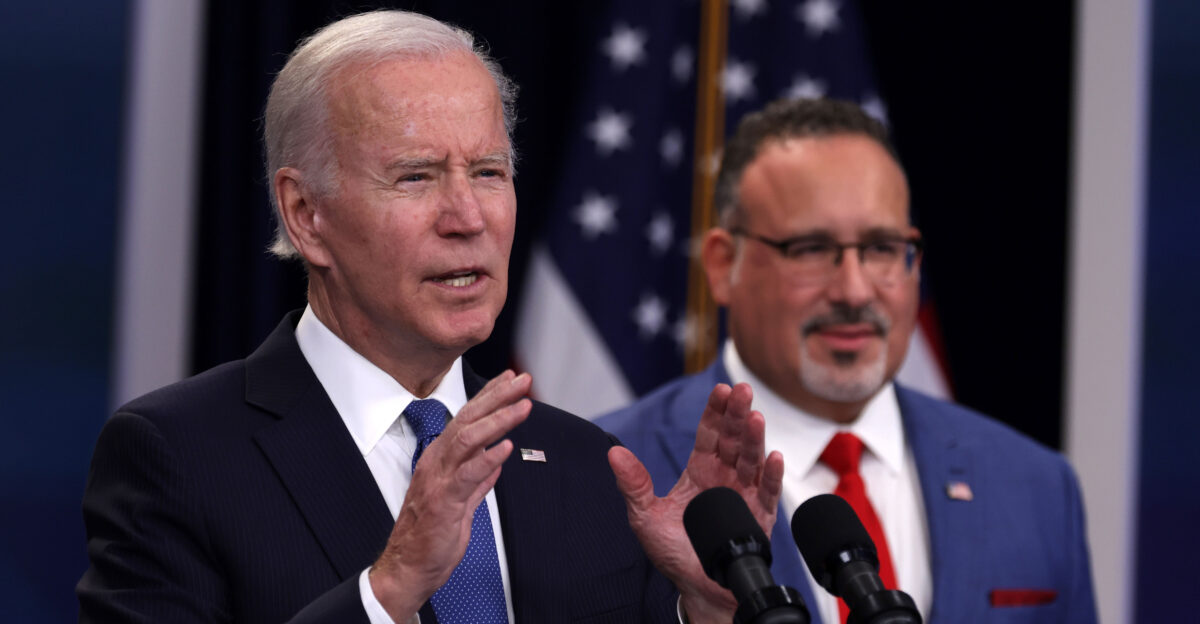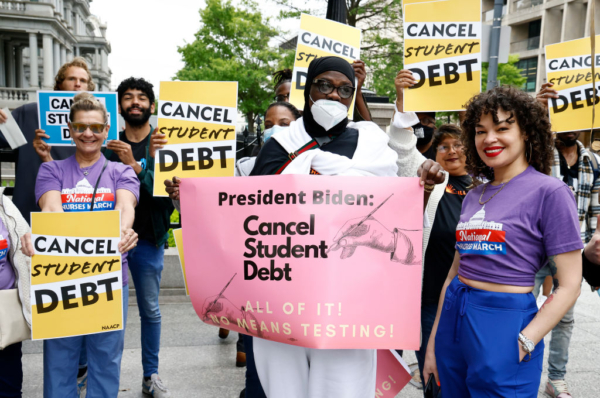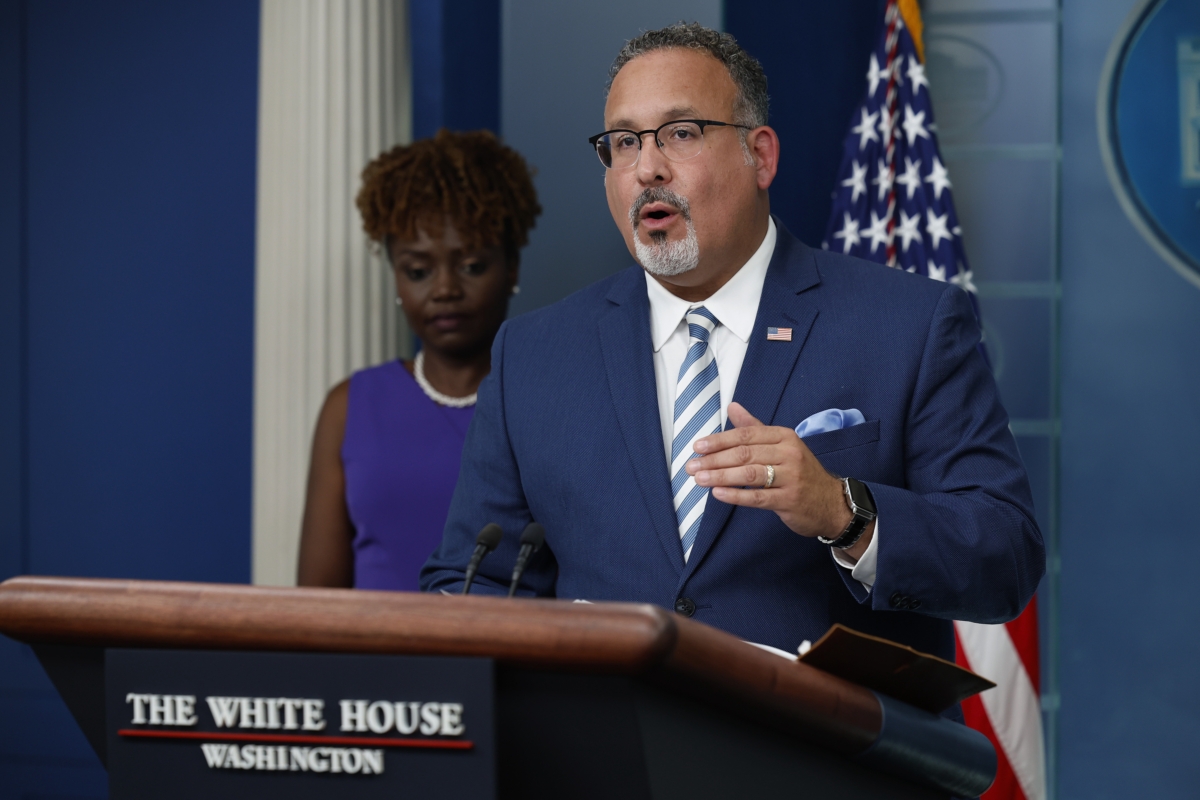Education Secretary Miguel Cardona said on Monday that the department will continue to extend support for student loan holders and look for ways to provide more relief for existing borrowers, two weeks after the Supreme Court struck down a government attempt to forgive millions of such loans.
“The goal is to be able to pay what you can afford. Right now people are falling into default because the college loan payments are too high for the salaries,” Mr. Cardona said.
“Clearly, we’re not done fighting for the borrowers. We’re not done fighting for accessible higher education and that’s something we’re going to be committed to.”
Mr. Cardona insisted that the Supreme Court “got it wrong” by striking down the forgiveness plan proposed by the Biden administration. However, any future decision on student loan forgiveness will be in line with the Supreme Court ruling, he added.

Mr. Cardona’s comments come after the Supreme Court ruled in a 6–3 decision on June 30 to strike down a student debt forgiveness plan proposed by the federal administration that would have wiped out as much as $20,000 in debt for around 40 million borrowers, costing the government $800 billion or more in the process.
Following the Supreme Court judgment, Mr. Cardona criticized the court for ruling “against students and families across the country.”
On the same day as the ruling, the Education Department announced a new income-driven repayment plan called Saving on a Valuable Education (SAVE), which Mr. Cardona said would be the “most affordable repayment plan in history.”
The Biden administration also announced that the secretary of education was looking to create “an alternative path to debt relief” for borrowers of student loans.
Then, on July 14, the Education Department announced a $39 billion plan that forgives outstanding loans of 804,000 borrowers provided they have made loan repayments for 20 to 25 years or 240 to 300 monthly payments.
The plan was criticized as being a burden on the American economy.
“President [Joe] Biden just granted over $39,000,000,000 in student loan forgiveness to 800,000 borrowers. America’s national debt is over $32,500,000,000,000+. This is insanity,” journalist Eric Spracklen said in a July 14 Twitter post.
The SAVE Scheme is estimated to cost $138 billion over a decade, according to the Education Department. The Congressional Budget Office projected costs to be around $230 billion while the Foundation for Government Accountability calculated that it would cost $471 billion.
As of July 14, the Biden administration has approved more than $116.6 billion in student loan forgiveness for more than 3.4 million borrowers, said the Education Department.
A Political Play?
While announcing the $39 billion forgiveness plan, Mr. Biden blamed the GOP for not caring enough about hardships faced by everyday Americans.
“Republican lawmakers—who had no problem with the government forgiving millions of dollars of their own business loans—have tried everything they can to stop me from providing relief to hardworking Americans,” the president said in a July 14 statement.
“Some are even objecting to the actions we announced today, which follows through on relief borrowers were promised, but never given, even when they had been making payments for decades. The hypocrisy is stunning, and the disregard for working and middle-class families is outrageous.”

Some political experts believe the student loan forgiveness program will aid in Biden’s presidential campaign by allowing him to portray the Republican Party in a bad light owing to the GOP’s opposition to the $39 billion plan.
John Pitney, a political scientist at Claremont McKenna College, told Newsweek that even if Biden is unsuccessful in implementing the forgiveness plan, he will still succeed politically.
“If Biden wins, he gets their gratitude for winning. If he loses, he still gets credit for fighting,” Mr. Pitney said. “And in the long run, losing could have an added benefit for Democrats.”
Political consultant Jay Townsend called the situation a “win-win” for Biden. Even if the plan is blocked by the Supreme Court, Mr. Biden can benefit from “great anger fuel for a political campaign next year,” he said.
An ‘Unfair’ Policy
Mr. Biden’s newly announced student loan forgiveness plan has triggered a debate over the economics and fairness of the policy.
In a July 15 Twitter post, Rep. Katie Porter (D-Calif.) called the plan “excellent news” for the U.S. economy.
“Student loan debt is crushing millions of Americans who’d otherwise be buying homes, opening small businesses, or investing in their retirement. I’m glad the Administration is providing relief where they can,” she said.
However, Paul Kamenar, the lead counsel for the National Legal and Policy Center told EpochTV’s “Crossroads” that the plan is “unfair to millions of students who have paid back their loans and took out second jobs to do that.”
“And now you have those who still owe this money that are being given a loan forgiveness up to some $39 billion worth. So, it’s a political gimmick to be sure,” he said.
“The taxpayer ultimately pays for any loan that’s forgiven because the money belongs to the Treasury. And what’s going to happen is, that money is not going to go into the Treasury. So, who’s going to make up the difference? We the taxpayers.”
In a July 14 Twitter post, Rep. Lisa McClain (R-Mich.) criticized Biden for the “unconstitutional” loan forgiveness scheme, calling it a “slap in the face to hard-working taxpayers that have dutifully paid off their student loans. Rest assured, come hell or high water, I will fight this blatant overreach until the end.”
















































